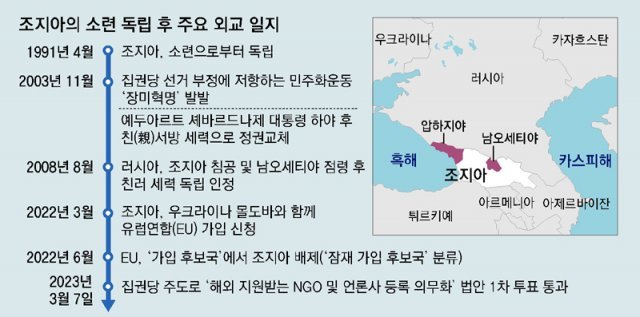Pro-Russian ruling party in power since 2012
Promoting pro-Russian reinforcement through the ‘Media Control Law’, “withdrawal” for the time being due to fierce resistance from citizens
Possibility of Russian intervention when leaning to one side… Russia merges Crimea with Ukrainian ‘pro-Western’
The ruling party in Georgia, the former Soviet Union, pushed for a bill to control foreign-sponsored media and civic groups, but met fierce resistance from citizens who said they were “against Russian-style evil laws.” Although the ruling party announced its intention to withdraw the bill due to opposition at home and abroad, analysts say that the latest incident is fueling Georgia’s anti-Russian public opinion, which has continued since the Russian invasion of Georgia in 2008. Concerns are also growing that Russia may be in the same situation as Ukraine, which forcibly annexed Crimea to Russia in 2014.

According to the US CNN, etc., tens of thousands of people gathered in front of the Georgian capital Tbilisi Council on the 8th to protest against the withdrawal of the ‘Foreign Agencies Act’. The main content of this law is that the media and non-governmental organizations (NGOs), which receive 20% or more of their annual income from overseas, are obliged to register as ‘foreign agents’ and submit details of funds. Violation may result in imprisonment of up to 5 years. The bill was passed by an overwhelming majority of 76-13 in the first reading (deliberation) led by the ruling party ‘Georgia’s Dream’ in the Georgia Assembly on the 7th. In Georgia, the bill passes through a third reading.
The bill is evaluated as being similar to the “Foreign Representation Law” passed in Russia in 2012, when Russian President Vladimir Putin regained power. At that time, Russia registered organizations that participated in political activities and received foreign funding as foreign agencies to comply with strict regulations, and later expanded the subject of registration to individuals. Russia has been criticized for abusing the law to suppress the Russian media and civil society.
Founded in 2012 by Vizina Ivanishvili, a former Russian oligarch (emerging conglomerate), ‘Georgia’s Dream’ is a pro-Russian political party that is taking a pragmatic route in Russia. In Georgia, which has a parliamentary system, it has been in power since 2012 and has maintained the position of the ruling party to this day.
Georgia, which was ruled by the former Soviet Union, is one of the countries with high anti-Russian sentiment. He also overthrew the pro-Russian regime in the 2003 Rose Revolution. In particular, the two countries severed ties after Russia invaded Georgia in the name of protecting South Ossetia, which has strong pro-Russian separatist tendencies, in 2008.
There are many views that the current situation is similar to the situation in Ukraine that led to Russia’s forcible annexation of Crimea after large-scale pro-Western protests in 2014. In November 2013, when then-Ukrainian President Viktor Yanukovych stopped discussions about joining the European Union (EU) and turned pro-Russian lines, a large-scale “Euromaidan Revolution” took place in Ukraine against it. Later, the government was replaced by pro-Western forces in Ukraine, but Russia used this as an excuse to invade Crimea.
When the news of the first passage of the Foreign Agency Act became known, there was a strong backlash at home and abroad. Georgians protested strongly, tearing down barriers outside the parliament and throwing Molotov cocktails at the police. Independent Georgia President Salome Zurabishvili publicly announced on social media that she would veto the bill, saying that she “shows her support for the protesters.” The EU’s High Representative for Foreign Affairs and Security, Joseph Borrell, said in a statement, “If this law is finally passed, which is not in line with EU values and standards, it could seriously affect the relationship between Georgia and the EU.”
On the 9th, the ruling party said, “(The bill) caused controversy socially. I will withdraw the bill without conditions,” he said, evolving, but citizens continue to protest. Civic activist Helen Hostaria posted on her Twitter, “It is difficult to trust the ruling party’s announcement. This protest is not just a demand for the withdrawal of the bill, but also a question of the pro-Russian orientation of the ruling party,” he stressed.
Source: Donga
Mark Jones is a world traveler and journalist for News Rebeat. With a curious mind and a love of adventure, Mark brings a unique perspective to the latest global events and provides in-depth and thought-provoking coverage of the world at large.